ray dalio 原则中文翻译 part1
《原则》 Principles 中英文对照

Introduction 简介Principles are concepts that can be applied over and over again in similar circumstances as distinct from narrow answers to specific questions. Every game has principles that successful players master to achieve winning results. So does life. Principles are ways of successfully dealing with the laws of nature or the laws of life. Those who understand more of them and understand them well know how to interact with the world more effectively than those who know fewer of them or know them less well. Different principles apply to different aspects of life - e.g., there are "skiing principles" for skiing, "parenting principles" for parenting, "management principles" for managing, “investment principles” for investing, etc - and there are over - arching "life principles" that influence our approaches to all things. And, of course, different people subscribe to different principles that they believe work best.原则是能够在相似场景下反复运用的一套概念,有别于具体问题的狭义回答。
达利欧原则原则清单
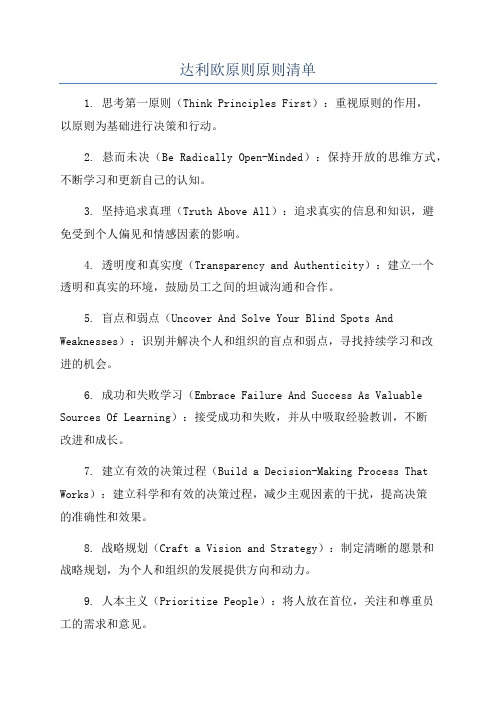
达利欧原则原则清单1. 思考第一原则(Think Principles First):重视原则的作用,以原则为基础进行决策和行动。
2. 悬而未决(Be Radically Open-Minded):保持开放的思维方式,不断学习和更新自己的认知。
3. 坚持追求真理(Truth Above All):追求真实的信息和知识,避免受到个人偏见和情感因素的影响。
4. 透明度和真实度(Transparency and Authenticity):建立一个透明和真实的环境,鼓励员工之间的坦诚沟通和合作。
5. 盲点和弱点(Uncover And Solve Your Blind Spots And Weaknesses):识别并解决个人和组织的盲点和弱点,寻找持续学习和改进的机会。
6. 成功和失败学习(Embrace Failure And Success As Valuable Sources Of Learning):接受成功和失败,并从中吸取经验教训,不断改进和成长。
7. 建立有效的决策过程(Build a Decision-Making Process That Works):建立科学和有效的决策过程,减少主观因素的干扰,提高决策的准确性和效果。
8. 战略规划(Craft a Vision and Strategy):制定清晰的愿景和战略规划,为个人和组织的发展提供方向和动力。
9. 人本主义(Prioritize People):将人放在首位,关注和尊重员工的需求和意见。
10. 建设性的冲突(Encourage Constructive Confrontation):鼓励建设性的冲突和辩论,通过不同观点的碰撞来促进创新和进步。
11. 团队合作(Foster a Culture of Collaboration):建立一个鼓励团队合作和集体智慧发挥的文化氛围。
12. 约定规则(Establish Clear Rules And Roles):明确规定每个人的角色和责任,并制定明确的工作规则和流程。
读书笔记分享《原则》瑞达利欧
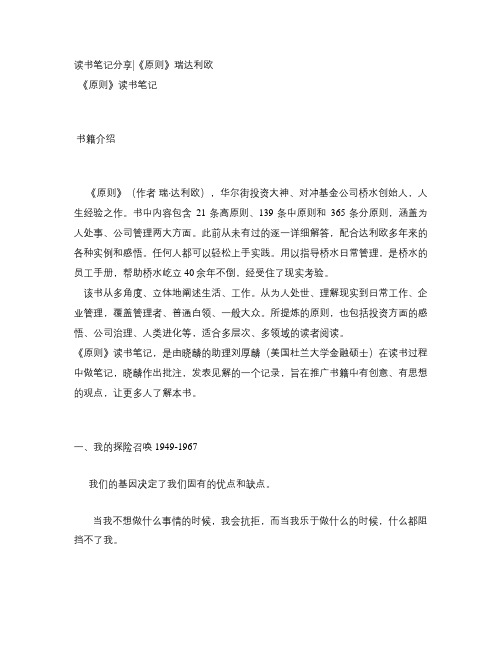
读书笔记分享|《原则》瑞达利欧《原则》读书笔记书籍介绍《原则》(作者瑞·达利欧),华尔街投资大神、对冲基金公司桥水创始人,人生经验之作。
书中内容包含21条高原则、139条中原则和365条分原则,涵盖为人处事、公司管理两大方面。
此前从未有过的逐一详细解答,配合达利欧多年来的各种实例和感悟。
任何人都可以轻松上手实践。
用以指导桥水日常管理,是桥水的员工手册,帮助桥水屹立40余年不倒,经受住了现实考验。
该书从多角度、立体地阐述生活、工作。
从为人处世、理解现实到日常工作、企业管理,覆盖管理者、普通白领、一般大众。
所提炼的原则,也包括投资方面的感悟、公司治理、人类进化等,适合多层次、多领域的读者阅读。
《原则》读书笔记,是由晓麟的助理刘厚麟(美国杜兰大学金融硕士)在读书过程中做笔记,晓麟作出批注,发表见解的一个记录,旨在推广书籍中有创意、有思想的观点,让更多人了解本书。
一、我的探险召唤1949-1967我们的基因决定了我们固有的优点和缺点。
当我不想做什么事情的时候,我会抗拒,而当我乐于做什么的时候,什么都阻挡不了我。
很好的事要比糟糕的事好,而糟糕的事要比平庸的事好,因为糟糕的事至少给生活增加了滋味。
二、跨越门槛1967-1979股价反映了人们的预期,所以当实际结果比预期好时,股价上涨;当实际结果比预期差时,股价下跌。
你最好弄明白其他时间、其他地点、其他人身上发生的事,因为如果你不这么做,你就不知道这些事情会不会发生在你身上,而且一旦发生在你身上,你将不知道如何应对。
在这方面有实践经验的人告诉我农业经营的过程,我把他们告诉我的东西组织成模型,然后使用这些模型考察随着时间的推移这些不同部分之间的互动关系。
没有任何东西是确定的:总是存在会给你造成重大损失的风险,即使在看起来最安全的押注中也是如此,所以,你最好总是假设自己没有看到全部。
尽管赚钱很好,但拥有有意义的工作和人际关系要比赚钱好得多。
金钱并没有固有的价值,金钱的价值来自它能买到的东西,但金钱并不能买到一切。
Principles by Ray Dalio
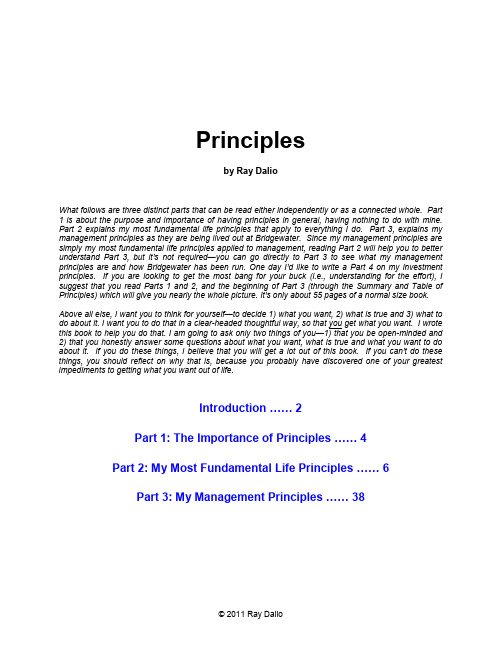
Principlesby Ray DalioWhat follows are three distinct parts that can be read either independently or as a connected whole. Part 1 is about the purpose and importance of having principles in general, having nothing to do with mine. Part 2 explains my most fundamental life principles that apply to everything I do. Part 3, explains my management principles as they are being lived out at Bridgewater. Since my management principles are simply my most fundamental life principles applied to management, reading Part 2 will help you to better understand Part 3, but it’s not required—you can go directly to Part 3 to see what my management principles are and how Bridgewater has been run. One day I’d like to write a Part 4 on my investment principles. If you are looking to get the most bang for your buck (i.e., understanding for the effort), I suggest that you read Parts 1 and 2, and the beginning of Part 3 (through the Summary and Table of Principles) which will give you nearly the whole picture. It’s only about 55 pages of a normal size book.Above all else, I want you to think for yourself—to decide 1) what you want, 2) what is true and 3) what to do about it. I want you to do that in a clear-headed thoughtful way, so that you get what you want. I wrote this book to help you do that. I am going to ask only two things of you—1) that you be open-minded and 2) that you honestly answer some questions about what you want, what is true and what you want to do about it. If you do these things, I believe that you will get a lot out of this book. If you can’t do these things, you should reflect on why that is, because you probably have discovered one of your greatest impediments to getting what you want out of life.Introduction (2)Part 1: The Importance of Principles (4)Part 2: My Most Fundamental Life Principles (6)Part 3: My Management Principles (38)Until recently, I didn’t write out these principles because I felt that it was presumptuous for me to tell others what would work best for them. But over time, I saw the people who I cared about most struggling with problems and wanted to help them; I also found that their problems were almost always the result of violating one or more of these principles, and that their problems could be solved by applying these principles. So I began writing down the types of problems and the broken principles that caused them. When I began, I didn’t know how many principles I would end up with but, through this process, I discovered that about 200 principles pretty much cover all the problems.IntroductionPrinciples are concepts that can be applied over and over again in similar circumstances as distinct from narrow answers to specific questions. Every game has principles that successful players master to achieve winning results. So does life. Principles are ways of successfully dealing with the laws of nature or the laws of life. Those who understand more of them and understand them well know how to interact with the world more effectively than those who know fewer of them or know them less well. Different principles apply to different aspects of life—e.g., there are “skiing principles” for skiing, “parenting principles” for parenting, “management principles” for managing, “investment principles” for investing, etc—and there are over-arching “life principles” that influence our approaches to all things. And, of course, different people subscribe to different principles that they believe work best. I am confident that whatever success Bridgewater and I have had has resulted from our operating by certain principles. Creating a great culture, finding the right people, managing them to do great things and solving problems creatively and systematically are challenges faced by all organizations. What differentiates them is how they approach these challenges. The principles laid out in the pages that follow convey our unique ways of doing these things, which are the reasons for our unique results. Bridgewater’s success has resulted from talented people operating by the principles set out here, and it will continue if these or other talented people continue to operate by them. Like getting fit, virtually anyone can do it if they are willing to do what it takes. What is written here is just my understanding of what it takes: my most fundamental life principles, my approach to getting what I want, and my “management principles,” which are based on those foundations. Taken together, these principles are meant to paint a picture of a process for the systematic pursuit of truth and excellence and for the rewards that accompany this pursuit. I put them in writing for people to consider in order to help Bridgewater and the people I care about most. 11 Since I learned these principles by encountering reality and reflecting on my encounters, and I am still doing these things, I expect there are more principles to come. So I am still creating this document by throwing various thoughts down when they occur to me, trying to put them in some sensible order and trying to smooth over the bumps. Organizing these principles into a sensible order is a challenge since they relate to each other more like a matrix than as a sequence. To help guide you, I’ve tried to organize them around large themes like building a great culture, managing people well, and creative problem-solving. I will continue these things, so this is an evolving document.I’m sure that I will come up with more as I learn more. When I say that these are my principles, I don’t mean that in a possessive or egotistical way. I just mean that they are explanations of what I personally believe. I believe that the people I work with and care about must think for themselves. I set these principles out and explained the logic behind them so that we can together explore their merits and stress test them. While I am confident that these principles work well because I have thought hard about them, they have worked well for me for many years, and they have stood up to the scrutiny of the hundreds of smart, skeptical people, I also believe that nothing is certain. I believe that the best we can hope for is highly probable. By putting them out there and stress testing them, the probabilities of their being right will increase.I also believe that those principles that are most valuable to each of us come from our own encounters with reality and our reflections on these encounters – not from being taught and simply accepting someone else’s principles. So, I put these out there for you to reflect on when you are encountering your realities, and not for you to blindly follow. What I hope for most is that you and others will carefully consider them and try operating by them as part of your process for discovering what works best for you. Through this exploration, and with their increased usage, not only will they be understood, but they will evolve from “Ray’s principles” to “our principles,” and Ray will fade out of the picture in much the same way as memories of one’s ski or tennis instructor fade and people only pay attention to what works.2There are of course lots of other types of principles. For example, I hope to one day write about my investment principles. However, management principles are now what we need most, so here are the ones that I think make sense and have worked for me. So, when digesting each principle, please……ask yourself: “Is it true?”Before I discuss the management principles themselves, it’s important for me to articulate my own most fundamental life principles because my management principles are an extension of them. In Part 1, I explain what I mean by principles, why I believe they are important, and how they are essential for getting what you want out of life. Part 2 explains my most fundamental life principles. I describe what I believe are the best ways of interacting with reality to learn what it’s like, and how to most effectively deal with it to get what you want. I also discuss what I believe are the most common traps that people fall into that prevent them from getting what they want, and how people’s lives can be radically better by avoiding them. I wrote this so you can better understand why my other principles are what they are, though you don’t need to read this part to understand the others. Part 3 is about my management principles. As I have run Bridgewater for more than 35 years, it explains Bridgewater’s approach up till now. It begins at the big-picture, conceptual level, with an explanation of why I believe that any company’s results are primarily determined by its people and its culture. It then drills down into what I believe are the important principles behind creating a great culture, hiring the right people, managing them to achieve excellence, solving problems systematically and making good decisions.2 While this particular document will always express just what I believe, others will certainly have their own principles, and possibly even their own principles documents, and future managers of Bridgewater will work in their own ways to determine what principles Bridgewater will operate by. At most, this will remain as one reference of principles for people to consider when they are deciding what’s important and how to behave.I believe that having principles that work is essential for getting what we want out of life. I also believe that to understand each other we have to understand each other’s principles.Part 1: The Importance of Principles 31) What are principles?That is why I believe we need to talk about them. We will begin by examining the following questions: What are principles? Why are principles important? Where do principles come from? Do you have principles that you live your life by? What are they? How well do you think they will work, and why? Answer all questions with complete honesty, without worrying what I or others might think. That honesty will allow you to be comfortable living with your own principles, and to judge yourself by how consistently you operate by them. If you don’t have many well-thought-out principles, don’t worry. We will get there together, if we remain open-minded. Your values are what you consider important, literally what you “value.” Principles are what allow you to live a life consistent with those values. Principles connect your values to your actions; they are beacons that guide your actions, and help you successfully deal with the laws of reality. It is to your principles that you turn when you face hard choices.2) Why are principles important? All successful people operate by principles that help them be successful. Without principles, you would be forced to react to circumstances that come at you without considering what you value most and how to make choices to get what you want. This would prevent you from making the most of your life. While operating without principles is bad for individuals, it is even worse for groups of individuals (such as companies) because it leads to people randomly bumping into each other without understanding their own values and how to behave in order to be consistent with those values. 3) Where do principles come from? Sometimes we forge our own principles and sometimes we accept others’ principles, or holistic packages of principles, such as religion and legal systems. While it isn’t necessarily a bad thing to use others’ principles—it’s difficult to come up with your own, and often much wisdom has gone into those already created—adopting pre-packaged principles without much thought exposes you to the risk of inconsistency with your true values . Holding incompatible principles can lead to conflict between values and actions—like the hypocrite who has claims to be of a religion yet behaves counter to its teachings. Your principles need to reflect values you really believe in.3 I wish everyone wrote down their principles. I wish I could read and compare the principles of all the people I’m interested in—Steve Jobs, Albert Einstein, people running for political office, people I share my life with, etc. I'd love to know what they value most and what principles they use to get what they want. Imagine how great that would be—e.g. imagine how much valuable fundamental thinking could be harnessed. I hope that my doing this will encourage others to do the same.4) Do you have principles that you live your life by? What are they?Your principles will determine your standards of behavior. When you enter into relationships with other people, your and their principles will determine how you interact. People who have shared values and principles get along. People who don’t will suffer through constant misunderstandings and conflict with one another. Too often in relationships, people’s principles are unclear. Thinkabout the people with whom you are closest. Are their values aligned with yours?5) How well do you think they will work, and why?Those principles that are most valuable come from our own experiences and our reflections onthose experiences. Every time we face hard choices, we refine our principles by asking ourselves difficult questions. For example, when our representatives in Washington are investigatingwhether various segments of society are behaving ethically, they are simultaneously grapplingwith questions such as, “Should the government punish people for bad ethics, or should it justwrite and enforce the laws?” Questions of this kind—in this case, about the nature ofgovernment—prompt thoughtful assessments of alternative approaches. These assessments in turn lead to principles that can be applied to similar occasions in the future. As another example, “I won’t steal” can be a principle to which you refer when the choice of whether or not to stealarises. But to be most effective, each principle must be consistent with your values, and thisconsistency demands that you ask: Why? Is the reason you won’t steal because you feelempathy for your potential victim? Is it because you fear getting caught? By asking suchquestions, we refine our understanding, and the development of our principles becomes betteraligned with our core values. To be successful, you must make correct, tough choices. You must be able to “cut off a leg to save a life,” both on an individual level and, if you lead people, on agroup level. And to be a great leader, it is important to remember that you will have to make these choices by understanding and caring for your people, not by following them.You have to answer these questions for yourself. What I hope for most is that you will carefully consider the principles we will be exploring in this document and try operating by them, as part of the process of discovering what works best for you. In time, the answers to these questions will evolve from “Ray’s principles” to “my principles,” and “Ray” will fade from the picture in much the same way as memories of your ski instructor or basketball coach fade after you have mastered the sport.So, as I believe that adopting pre-packaged principles without much thought is risky, I am asking you to join me in thoughtfully discussing the principles that guide how we act. When considering each principle, please ask yourself, “Is it true?” While this particular document will always express just what I believe, other people will certainly have their own principles, and possibly even their own principles documents, and future managers of Bridgewater will work in their own ways to determine what principles Bridgewater will operate by. At most, this will remain as one reference of principles for people to consider when they are deciding what’s important and how to behave.I grew up in a middle-class neighborhood on Long Island, the only son of a jazz musician and a stay-at-home mom. I was a very ordinary kid, and a less-than-ordinary student. I liked playing with my friends—for example, touch football in the street—and I didn't like the school part of school, partly because I had, and still have, a bad rote memory Part 2: My Most Fundamental Life Principles Time is like a river that will take you forward into encounters with reality that will require you to make decisions. You can’t stop the movement down this river, and you can’t avoid the encounters. You can only approach these encounters in the best way possible. That is what this part is all about.Where I’m Coming FromSince we are all products of our genes and our environments and approach the world with biases, I think it is relevant for me to tell you a bit of my background so that you can know where I’m coming from. 41) It isn't easy for me to be confident that my opinions are right. In the markets, you can do a huge amount of work and still be wrong. and partly because I couldn’t get excited about forcing myself to remember what others wanted me to remember without understanding what all this work was going to get me. In order to be motivated, I needed to work for what I wanted, not for what other people wanted me to do. And in order to be successful, I needed to figure out for myself how to get what I wanted, not remember the facts I was being told to remember. One thing I wanted was spending money. So I had a newspaper route, I mowed lawns, I shoveled the snow off driveways, I washed dishes in a restaurant, and, starting when I was 12 years old, I caddied. It was the 1960s. At the time the stock market was booming and everyone was talking about it, especially the people I caddied for. So I started to invest. The first stock I bought was a company called Northeast Airlines, and the only reason I bought it was that it was the only company I had heard of that was trading for less than $5 per share, so I could buy more shares, which I figured was a good thing. It went up a lot. It was about to go broke but another company acquired it, so it tripled. I made money because I was lucky, though I didn’t see it that way then. I figured that this game was easy. After all, with thousands of companies listed in the newspaper, how difficult could it be to find at least one that would go up? By comparison to my other jobs, this way of making money seemed much more fun, a lot easier, and much more lucrative. Of course, it didn’t take me long to lose money in the markets and learn about how difficult it is to be right and the costs of being wrong. So what I really wanted to do now was beat the market. I just had to figure out how to do it. The pursuit of this goal taught me:4 Rote memory is memory for things that don’t have an intrinsic logic for being what they are, like a random series of numbers, words in a foreign language and people’s names (all of which I have trouble with). On the other hand, I have a great memory for things that make sense in a context. For example, I can tell you what happened in every year in the economy and markets since the mid-1960s and how many things work.2) Bad opinions can be very costly. Most people come up with opinions and there’s no cost to them. Not so in the market. This is why I have learned to be cautious. No matter how hard I work, I really can’t be sure. 3) The consensus is often wrong, so I have to be an independent thinker. To make any money, you have to be right when they’re wrong. So … ...1) I worked for what I wanted, not for what others wanted me to do. For that reason, I never felt that I had to do anything. All the work I ever did was just what I needed to do to get what I wanted. Since I always had the prerogative to not strive for what I wanted, I never felt forced to do anything. ...2) I came up with the best independent opinions I could muster to get what I wanted. For example, when I wanted to make money in the markets, I knew that I had to learn about companies to assess the attractiveness of their stocks. At the time, Fortune magazine had a little tear-out coupon that you could mail in to get the annual reports of any companies on the Fortune 500, for free. So I ordered all the annual reports and worked my way through the most interesting ones and formed opinions 5...3) I stress-tested my opinions by having the smartest people I could find challenge them so I could find out where I was wrong. about which companies were exciting. 6...4) I remained wary about being overconfident, and I figured out how to effectively deal with my not knowing. I dealt with my not knowing by either continuing to gather information until I reached the point that I could be confident or by eliminating my exposure to the risks of not knowing. I never cared much about others’ conclusions—only for the reasoning that led to these conclusions. That reasoning had to make sense to me. Through this process, I improved my chances of being right, and I learned a lot from a lot of great people. 7...5) I wrestled with my realities, reflected on the consequences of my decisions, and learned and improved from this process. By doing these things, I learned how important and how liberating it is to think for myself. In a nutshell, this is the whole approach that I believe will work best for you—the best summary of what I want the people who are working with me to do in order to accomplish great things. I want you to work for yourself, to come up with independent opinions, to stress-test them, to be wary about being overconfident, and to reflect on the consequences of your decisions and constantly improve. After I graduated from high school, I went to a local college that I barely got in to. I loved it, unlike high school, because I could learn about things that interested me; I studied because I enjoyed it, not because I had to.5 The way I learn is to immerse myself in something, which prompts questions, which I answer, prompting more questions, until I reach a conclusion.6 This included my retail stockbroker, the people I was caddying for, even my local barber, who was equally engrossed in the stock market. (It wasn’t as precocious as it sounds. At the time, instead of talking about the Yankees, everyone was talking about stocks. That was the world I grew up in.)7 Sometimes when I know that I don’t know which way the coin is going to flip, I try to position myself so that it won’t have an impact on me either way. In other words, I don’t make an inadvertent bet. I try to limit my bets to the limited number of things I am confident in.At that time the Beatles had made a trip to India to learn how to meditate, which triggered my interest, so I learned how to meditate. It helped me think more clearly and creatively, so I’m sure that enhanced my enjoyment of, and success at, learning.88 By the way, I still meditate and I still find it helpful.Unlike in high school, in college I did very well. And of course I continued to trade markets. Around this time I became interested in trading commodities futures, though virtually nobody traded them back then. I was attracted to trading them just because they had low margin requirements so I figured I could make more money by being right (which I planned to be). By the time I graduated college, in 1971, I had been admitted to Harvard Business School, where I would go in the fall. That summer between college and HBS I clerked on the floor of the New York Stock Exchange. This was the summer of the breakdown of the global monetary system (i.e., the Bretton Woods system). It was one of the most dramatic economic events ever and I was at the epicenter of it, so it thrilled me. It was a currency crisis that drove all market behaviors, so I delved into understanding the currency markets. The currency markets would be important to me for the rest of my life. That fall I went to Harvard Business School, which I was excited about because I felt that I had climbed to the top and would be with the best of the best. Despite these high expectations, the place was even better than I expected because the case study method allowed open-ended figuring things out and debating with others to get at the best answers, rather than memorizing facts. I loved the work-hard, play-hard environment. In the summer between my two years at HBS, I pursued my interest in trading commodities futures by convincing the Director of Commodities for Merrill Lynch to give me a job as his assistant. At the time, commodities trading was still an obscure thing to do. In the fall I went back to HBS, and in that academic year, 1972-73, trading commodities futures became a hot thing to do. That is because the monetary system’s breakdown that occurred in 1971 led to an inflationary surge that sent commodity prices higher. As a result of this, the first oil shock occurred in 1973. As inflation started to surge, the Federal Reserve tightened monetary policy to fight it, so stocks went down in the worst bear market since the Great Depression. So, commodities futures trading was hot and stock market investing was not. Naturally, brokerage houses that didn’t have commodities trading departments wanted them, and there was a shortage of people who knew anything about it. Virtually nobody in the commodities futures business had the type of Harvard Business School background that I had. So I was hired as Director of Commodities at a moderate-size brokerage and given an old salt who had lots of commodities brokerage experience to help me set up a commodities division. The bad stock market environment ended up taking this brokerage house down before we could get the commodities futures trading going. I went to a bigger, more successful brokerage, where I was in charge of its institutional/hedging business. But I didn’t fit into the organization well, so I was fired essentially for insubordination. So in 1975, after a quick two-year stint on Wall Street after school, I started Bridgewater. Soon after, I got married and began my family. Through this time and till now I followed the same basic approach I used as a 12-year-old caddie trying to beat the market, i.e., by 1) working for what I wanted, not for what others wanted me to do; 2) coming up with the best independent opinions I could muster to move toward my goals; 3) stress-testing my opinions by having the smartest people I could find challenge them so I could find out where I was wrong; 4) being wary about overconfidence, and good at not knowing; and 5) wrestling with reality, experiencing the results of my decisions, and reflecting on what I did to produce them so that I could improve.Since I started Bridgewater, I have gained a lot more experience that taught me a lot more, mostly by making mistakes and learning from them. Most importantly:I learned that failure is by and large due to not accepting and successfully dealing with therealities of life, and that achieving success is simply a matter of accepting and successfullydealing with all my realities.I learned that finding out what is true, regardless of what that is, including all the stuff most peoplethink is bad—like mistakes and personal weaknesses—is good because I can then deal withthese things so that they don’t stand in my way.I learned that there is nothing to fear from truth. While some truths can be scary—for example,finding out that you have a deadly disease—knowing them allows us to deal with them better.Being truthful, and letting others be completely truthful, allows me and others to fully explore our thoughts and exposes us to the feedback that is essential for our learning.I learned that being truthful was an extension of my freedom to be me. I believe that people whoare one way on the inside and believe that they need to be another way outside to please others become conflicted and often lose touch with what they really think and feel. It’s difficult for them to be happy and almost impossible for them to be at their best. I know that’s true for me.I learned that I want the people I deal with to say what they really believe and to listen to whatothers say in reply, in order to find out what is true. I learned that one of the greatest sources ofproblems in our society arises from people having loads of wrong theories in their heads—often theories that are critical of others—that they won’t test by speaking to the relevant people about them. Instead, they talk behind people’s backs, which leads to pervasive misinformation. I learned to hate this because I could see that making judgments about people so that they are tried andsentenced in your head, without asking them for their perspective, is both unethical andunproductive.9 So I learned to love real integrity (saying the same things as one believes)10 and to despise the lack of it.11I learned that everyone makes mistakes and has weaknesses and that one of the most importantthings that differentiates people is their approach to handling them. I learned that there is anincredible beauty to mistakes, because embedded in each mistake is a puzzle, and a gem that I could get if I solved it, i.e., a principle that I could use to reduce my mistakes in the future. Ilearned that each mistake was probably a reflection of something that I was (or others were)doing wrong, so if I could figure out what that was, I could learn how to be more effective. Ilearned that wrestling with my problems, mistakes, and weaknesses was the training thatstrengthened me. Also, I learned that it was the pain of this wrestling that made me and thosearound me appreciate our successes.129 It is unethical because a basic principle of justice is that everyone has the right to face his accuser. And it is unproductive because it does not lead to the exploration of “Is it true?” which can lead to understanding and improvement.10 I do not mean that you should say everything you think, just that what you do say matches your thoughts.11 The word “integrity” is from the Latin root “integer,” which means “one” i.e., that you are the same inside and out. Most people would be insulted if you told them that they don't have integrity—but how many people do you know who tell people what they really think?12 I believe that our society's “mistakephobia” is crippling, a problem that begins in most elementary schools, where we learn to learn what we are taught rather than to form our own goals and to figure out how to achieve them. We are fed with facts and tested and those who make the fewest mistakes are considered to be the smart ones, so we learn that it is embarrassing to not know and to make mistakes. Our education system spends virtually no time on how to learn from mistakes, yet this is critical to real learning. As a result, school typically doesn’t prepare young people for real life—unless their lives are spent following instructions and pleasing others. In my opinion, that’s why so many students who succeed in school fail in life.。
Ray Dalio 《Principles》
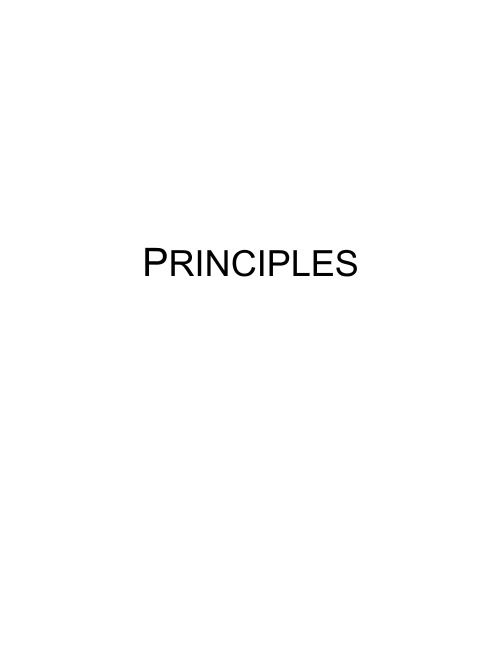
P RINCIPLESIntroductionChapter 1 – My Most Fundamental PrinciplesChapter 2 – How to Get What You WantChapter 3 – My 5-Step Process1) Goals, 2) Problems, 3) Diagnoses, 4) Designs and 5) TasksChapter 4 – My Management PrinciplesGet the People and the Culture RightGetting SpecificA) To Get the Culture Right……Truth is Essential…Recognize That Mistakes are Good if They Result in Learning…Constantly Get in SynchB) To Get the People Right……The Most Important Decision You Make is Choosing theResponsible Party…Recognize That People are Built Very Differently…Hire Right, Because the Penalties of Hiring Wrong are Huge…Understand the Differences Between Managing,Micromanaging and Not Managing…Probe Deep and Hard…Evaluate People Accurately, Not Kindly…Train and Test People through Experiences…Sort People into Other Jobs or Boxes at Bridgewater, orRemove Them from BridgewaterC) To Perceive, Diagnose and Solve Problems……Know How to Perceive Problems Effectively…Follow a Systematic Approach to Diagnosing Problems…Put Things in Perspective…Design Your Plan and Your Machine…Do What You Set Out To DoD) To Make Decisions Effectively ……Recognize the Power of Knowing How to Deal With NotKnowing…Think Probabilistically and About What MattersIntroductionPrinciples are concepts that can be applied over and over again in similar circumstances as distinct from narrow answers to specific questions. Every game has principles that successful players master to achieve winning results. So does life. Principles are ways of successfully dealing with the laws of nature or the laws of life. Those who understand more of them and understand them well know how to interact with the world more effectively than those who know fewer of them or know them less well. Different principles apply to different aspects of life – e.g., there are “skiing principles” for skiing, “parenting principles” for parenting, “management principles” for managing, “investment principles” for investing, etc. – and there are over-arching “life principles” that influence our approaches to all things. And, of course, different people subscribe to different principles that they believe work best.I am confident that whatever success Bridgewater and I have had has resulted from our operating by certain principles. Creating a great culture, finding the right people, managing them to do great things and solving problems creatively and systematically are challenges faced by all organizations. What differentiates them is how they approach these challenges. The principles laid out in the pages that follow convey our unique ways of doing these things, which are the reasons for our unique results. Bridgewater’s success has resulted from talented people operating by the principles set out here, and it will continue if these or other talented people continue to operate by them. Like getting fit, virtually anyone can do it if they are willing to do what it takes.What is written here is just my understanding of what it takes: my most fundamental life principles, my approach to getting what I want, and my “management principles,” which are based on those foundations. Taken together, these principles are meant to paint a picture of a process for the systematic pursuit of truth and excellence and for the rewards that accompany this pursuit. I put them in writing for people to consider in order to help Bridgewater and the people I care about most.Until recently, I didn’t write out these principles because I felt that it was presumptuous for me to tell others what would work best for them. But over time, I saw the people who I cared about most struggling with problems and wanted to help them; I also found that their problems were almost always the result of violating one or more of these principles, and that their problems could be solved by applying these principles. So I began writing down the types of problems and the broken principles that caused them. When I began, I didn’t know how many principles I would end up with but, through this process, I discovered that about 300 principles pretty much cover all the problems.1 I’m sure that I will come up with more as I learn more.When I say that these are my principles, I don’t mean that in a possessive or egotistical way. I just mean that they are explanations of what I personally believe. I believe that the people I work with and care about must think for themselves. I set these principles out and explained the logic behind them so thatwe can together explore their merits and stress test them. While I am confident that these principles work well because I have thought hard about them, they have worked well for me for many years, and they have stood up to the scrutiny of the hundreds of smart, cynical people, I also believe that nothing is certain. I believe that the best we can hope for is highly probable. By putting them out there and stress testing them, the probabilities of their being right will increase.I also believe that those principles that are most valuable to each of us come from our own encounters with reality and our reflections on these encounters – not from being taught and simply accepting someone else’s principles. So, I put these out there for you to reflect on when you are encountering your realities, and not for you to blindly follow. What I hope for most is that you and others will carefully1 Since I learned these principles by encountering reality and reflecting on my encounters, and I am still doing these things, I expect there are more principles to come. So I am still creating this document by throwing various thoughts down when they occur to me, trying to put them in some sensible order and trying to smooth over the bumps. Organizing these principles into a sensible order is a challenge since they relate to each other more like a matrix than as a sequence. To help guide you, I’ve tried to organize them around large themes like building a great culture, managing people well, and creative problem-solving. I will continue these things, so this is an evolving document.consider them and try operating by them as part of your process for discovering what works best for you. Through this exploration, and with their increased usage, not only will they be understood, but they will evolve from “Ray’s principles” to “our principles,” and Ray will fade out of the picture in much the same way as memories of one’s ski or tennis instructor fade and people only pay attention to what works.2 So, when digesting each principle, please……ask yourself: Is it true?Before I discuss the management principles themselves, it’s important for me to articulate my own most fundamental life principles because my management principles are an extension of them. So, in Chapter 1, I explain why I believe that understanding what reality is, how it works and how to deal with it to get what you want is both fundamentally good and rewarded.In Chapter 2, I describe what I believe are the best ways of interacting with reality to learn what it’s like, and how to most effectively deal with it to get what you want. I also discuss what I believe are the most common traps that people fall into that prevent them from getting what they want, and how people’s lives can be radically better by avoiding them. This chapter is fundamental to understanding why we behave the way we do at Bridgewater.Chapter 3 lays out a framework that I developed and follow for achieving goals, whatever they might be. This 5-Step Process is a specific and systematic structure that frames almost all of the discussions we have at Bridgewater about getting things done. It has broad applications in both business and life. I sincerely believe that people who follow these five steps can get almost anything they want out of life. In Chapter 4, I explain my management principles, which are based on the principles described in the first three chapters. What I convey here are not only individual principles, but a framework of principles that hang together to comprise our culture at Bridgewater. The chapter begins at the big-picture, conceptual level, with an explanation of why I believe that any company’s results are primarily determined by its people and its culture. It then drills down into what I believe are the important principles behind creating a great culture, hiring the right people, managing them to achieve excellence, solving problems systematically and making good decisions.There are of course lots of other types of principles. For example, I hope to one day write about my investment principles. However, management principles are now what we need most, so here are the ones that I think make sense and have worked for me. I believe that for any individual and for any organization to live up to their potentials, they must have clearly understood 1) values, 2) goals that are consistent with these values, and 3) ways of operating that are consistent with these values and goals. I believe that, to be clearly understood, these values, goals and ways of doing things must be spelled out. The purpose of my writing the “Principles” in such a comprehensive way is to make them crystal clear. What you decide to do with them is up to you.2 While this particular document will always express just what I believe, others will certainly have their own principles, and possibly even their own principles documents, and future managers of Bridgewater will work in their own ways to determine what principles Bridgewater will operate by. At most, this will remain as one reference of principles for people to consider when they are deciding what’s important and how to behave.Chapter 1 – My Most Fundamental PrinciplesAs mentioned in the Introduction, principles are concepts that can be applied over and over again in similar circumstances, as distinct from narrow answers to very specific questions. Principles are ways of successfully dealing with the laws of nature or the laws of life. Those who understand more of them and understand them better know how to interact with the world more effectively than those who know fewer of them or know them less well.In the following pages, I will share with you many of the principles I have learned and believe work. I only ask that you consider them with an open mind. You have to assess them for yourself because I’m certainly not trying to tell you what to do, and I’m not 100% sure of anything. Also, I’m not saying they’re going to work 100% of the time. Like good principles you might use when deciding how to play a poker hand, they won’t work every time because “luck” (i.e., the unanticipated) also plays a role.Every day, everything that happens has principles embedded in them. For example, putting your hand on a hot stove teaches you at least one principle. If you learn that principle, it will help you improve your ways of dealing with life. If you don’t, you’ll continue to get burned. So, I believe that there is an incredible beauty to mistakes, because embedded in each mistake is a puzzle and a gem to be had if you solve the puzzle. If you recognize that each mistake is probably a reflection of something you or others don’t understand about how to interact with the world as it is, and you figure out what that is, you will gain one or more gems, or what I call principles. People who recognize that all our experiences, rewards and punishments are essentially life’s instructions repeatedly thrown at us are more likely to learn how to live life more effectively (i.e., by principles), and favorably adapt their behaviors. What I am saying is that you don’t need to do much more than experience what the challenges and opportunities that life will bring you with an open mind, and you will learn how to get what you want out of life.Though I might sound philosophical, I am a hyperrealist. I believe one needs to deeply understand, accept and work with reality to produce great results and to be happy. Whether it is knowing how people really think and behave when dealing with them, or understanding in detail how things really work in physics, economics or physiology, so that if you do X then Y will happen, understanding these realities gives you the power to get what you want out of life – or at least dramatically improves your odds. So, what follows is a description of how I believe reality works and how to deal with it to get what we want. When I say I’m a hyperrealist, people sometimes think I don’t believe in making dreams happen. This couldn’t be further from the truth. In fact, I believe that without pursuing dreams life is mundane. I am just saying that hyperrealism is the best way to choose and achieve one’s dreams. The people who really change the world are the ones who see what’s possible and figure out how to make that happen. I believe that idealists, who simply imagine things that would be nice but are not possible, don’t sufficiently appreciate the laws of the universe to even know what would be nice. Let me explain what I mean.I believe there is an infinite number of laws of the universe and that all progress or dreams achieved come from operating in a way that’s consistent with them. These principles have always existed. Man didn’t and can’t make them up. He can only hope to understand them and use them to get what he wants. For example, the ability to fly or to send cellular phone signals imperceptibly and instantaneously around the world or any other new and beneficial developments resulted from using and understanding previously existing laws of the universe. These inventions did not come from people who were not well grounded in reality. The same is true for economic, political and social systems that work. Success is achieved by people who deeply understand reality and know how to use it to get what they want. The converse is also true: idealists who are not well grounded in reality create problems, not progress. For example, communism was a system created by people with good intentions who failed to recognize that their idealistic system was inconsistent with human nature. As a result, they caused more harm than good. My belief is that truth – or, more precisely, accurate understanding of reality – is the essential foundation for producing good outcomes.I know I’m pretty extreme in these beliefs. For example, as a hyperrealist, I have a non-traditional sense of good and bad. I believe that being good means operating consistently with reality (i.e., natural laws). Operating this way will likely result in rewards for you and for society as a whole. Being bad means operating inconsistently with these laws, which will likely result in punishment for you and harm to society as a whole. So I believe that for something to be good, it has to work to make things better; and to do that, it must be grounded in reality.Understanding what is good is obtained by looking at the way the world works. But it is not obvious. I think it’s educational and enjoyable to study how things work in nature and to assume that however they work is in some way good. I like to try to figure out why they’re working this way is good in the context of the whole system.3 I also believe that sometimes the conclusions are at odds with traditional notions of good and bad, which can sometimes make accepting these laws of nature, or principles, difficult.For example, when a pack of hyenas takes down a young wildebeest, is that good or evil? At face value, that might not be “good” because it seems cruel, and the poor wildebeest suffers and dies. Some people might even say that the hyenas are evil. Yet this type of apparently “cruel” behavior exists throughout the animal kingdom. Like death itself, it is integral to the enormously complex and efficient system that has worked for as long as there has been life. It is good for both the hyenas who are operating in their self-interest and the interest of the greater system, including those of the wildebeest, because killing and eating the wildebeest fosters evolution (i.e., the natural process of improvement). In fact, if you changed anything about the way that dynamic works, the overall outcome would be worse.I believe that evolution, which is generally the natural move toward better adaptation, is the greatest single force in the universe. It affects the changes of everything from all species to the entire solar system. Based on how I observe both nature and humanity working, I believe that what is bad and most punished are those things that don’t work because they are at odds with the laws of the universe and impede evolution. I believe that the desire to evolve (i.e., to get better) is probably humanity’s most pervasive driving force.4 Enjoying your job, a craft, or your favorite sport comes from the innate satisfaction of getting better. Though most people typically think that they are striving to get things (e.g., toys, better houses, money, status, etc.) that will make them happy, that is not really the case. When we get the things we are striving for, we rarely remain satisfied,5 so we seek other things or we seek to make the things we have better, and, in the process of this seeking, we continue to evolve. The things we are striving for are just the bait to get us to chase after them in order to make us evolve, and it is the evolution and not the reward itself that matters.It is only logical that it is that way – i.e., that our lives are not satisfied by obtaining our goals rather than by striving for them – because of the law of diminishing returns.6 For example, suppose making a lot of money is your goal and suppose you make enough so that making more has no marginal utility. Then it would be silly to continue to have making money be your goal. People who acquire things beyond their usefulness will not only derive little or no marginal gains from these acquisitions but they also will experience negative consequences, as with any form of gluttony. So, it is only logical that seeking3 To me it’s probably wrong and certainly presumptuous to assume that one’s theory of life is right when it’s inconsistent with the way things work in nature. Man is a manifestation of nature – just one infinitesimally small manifestation among zillions. If mankind disappeared, it wouldn't change the universe one iota. So who makes the rules – man or nature? Whether we acknowledge it or not, we are governed by nature's rules. It is silly, futile and arrogant for man to think that he can make up rules that will work that are inconsistent with nature's rules. To be successful, we must understand and abide by nature's rules. Man thinks of himself as intelligent and much more evolved than animals, but the truth is that he has about as much understanding of the universe as moss growing on an apple. Most people find it difficult acknowledging they don’t know things, which causes them to spend too much time wrestling with questions that won’t be answered and/or coming up with wrong answers (which is worse than recognizing one doesn’t know the answer). For example, asking questions like “what is it all for” and expecting to come up with the answer is like expecting a crab to understand the meaning of the universe. It’s also not all that important to have the answers in order do what you need to do. All other species manage to pursue their self-interests, contribute to evolution and evolve without having a clue of how the whole thing works. They are virtually perfect and perfectly doing their jobs without knowing how they fit into the scheme of things.4 To be more precise, I believe that this desire to evolve occurs only after we have taken care of our survival needs.5 Of course, we are often satisfied with the same things – relationships, careers, etc.—but when that is the case, it is typically because we are getting new enjoyments from the new dimensions of these things.6 The marginal benefits of moving from a shortage to an abundance of anything decline.something new, or seeking new depths of something old, is required to bring us satisfaction. For this reason I believe that it is the evolutionary process that occurs through the sequence of 1) seeking new things (goals), 2) working and learning in the process of pursuing these goals, 3) obtaining these goals and 4) then doing this over and over again, that creates personal evolution and fulfills most of us. And I believe that it is this process that moves society forward.So, based on how I observe reality working, it seems that what is most rewarded (therefore what is “good”) are those things that are in harmony with the laws of the universe (i.e., reality) and that contribute to its evolution. Similarly, it seems that what is punished (and is “bad”) are those things that are at odds with the laws of the universe and impede its evolution. Look at all species in action: they are constantly pursuing their own interests and helping evolution in a symbiotic way. Like the hyenas attacking the wildebeest, successful people might not even know if or how their pursuit of self-interest helps society, but it typically does.Along these lines, I believe that self-interest and society’s interests are generally symbiotic – e.g., I observe that society typically rewards those who give it what it wants and penalizes those who operate inconsistently with those wants.7 If you give society what it wants, you practically can’t help getting rewarded. That is why how much money people have earned is a rough measure of how much they gave society what it wanted. It’s also why most people who have made a lot of money typically never made making a lot of money their primary goal. Instead, they typically engaged in the game or craft of what they were doing, got very good at it and society rewarded them because it valued what they were doing. In other words, I believe that the way “reality” generally works is that it is the pursuit of self-interest that motivates people to push themselves to do the difficult things that are required to produce what society wants, and society rewards those who give it what it wants. That is why self-interest is a far more powerful force for good than mercy and charity, though mercy and charity are certainly natural and beneficial forces in some cases.8As Darwin described, adaptation – i.e., adjusting appropriately to changes in one’s circumstances – is a big part of this evolutionary process.9 That is why some of the most successful people are typically those who see the changing landscape and identify how to best adapt to it.10 So the classic process for achieving success is trying to give society what it wants in order to gain its rewards in return.This does not pertain just to moving forward; it also relates to dealing with setbacks. Inevitably one encounters major and painful setbacks. Those who have the ability to successfully adapt to setbacks will also be rewarded.So what is success? It is nothing more than getting what you want. It is up to you to decide what that is for you. However, for most people success is evolving as effectively as possible – i.e., learning about oneself and one’s environment and then changing to improve. Personally,I believe that personal evolution is both the greatest accomplishment and the greatest reward.117 I want to be clear that I am referring to what the society wants as distinct from what is good for it. For example, over the short run, it often penalizes those who give it what is good for it, though society will pay a penalty for that, and the evolutionary process will continue by paying these consequences and then adjusting.8 Said differently, I find that relationships are generally far more symbiotic than sympathetic. In some cases, though, such as parents taking care of their offspring, the reverse is the case, and I believe this is good. Still, mercy and charity are also rewarding, especially for people who have evolved beyond their basic needs and their superficial selfishness. However, only a small percentage of the population has reached this state, which is why self-interest is a more powerful force.9 Darwin said “It’s not the strongest species that survive, nor the most intelligent, but those most able to adapt.”10 Your ability to see the changing landscape and adapt is more a function of your perceptive and reasoning abilities than your ability to learn and process quickly.11 It also seems to me that, for most people, happiness is much more determined by how things turn out relative to your expectations rather than the absolute level of your conditions. For example, if a billionaire loses $200 million he will probably be unhappy while if someone who is worth $10 thousand unexpectedly gets another $2 thousand, he will probably be happy. This basic principle means that you can follow one of two paths to happiness: 1) have high expectations and strive to exceed them; or 2) lower your expectations so that they are at or below your conditions. For those who choose the first path, which is most of us, there is another principle that’s worth keeping in mind. As Freud pointed out, meaningful work and meaningful relationships are the two main components for a happy life. The work doesn’t necessarily have to be a job, though I believe it’s generally better if it is a job. It can be any kind of long-term challenge that leads to your personal improvement. As you might have guessed, I believe that the need to have meaningful work is connected to man’s innate desire to improve. And relationships are the natural connections to others that make us relevant to society.Chapter 2 – How to Get What You WantLife consists of an enormous number of choices that come at us, and each choice has consequences, so the quality of our lives depends on the quality of the choices we make. We aren’t born with theability to make good choices; we learn it. The way life literally works is that we all start off as children with others, typically parents, directing us. But, as we get older, we increasingly make our own choices. Most importantly, we choose what we are going after (i.e., our goals), which influence our directions. Forexample, if you want to be a doctor, you go to med school; if you want to have a family, you find a mate, and so on. As we move toward our goals, we encounter reality. Most importantly, we encounter problems, make mistakes and run into personal weaknesses. Above all else, how we choose to approach these impediments determines how fast we move toward our goals. Wrestling with these problems, mistakes and weaknesses is the training that strengthens us. It is also the pain of this wrestling that makes us appreciate our successes. People who make the most of the process of encountering reality, especially the painful obstacles, learn more and get what they want faster thanpeople who do not. Along the way, our skills and preferences change. It is a rare person who goes after the same things late life as they went after early in life. However, the core values and abilities 12 that influence the things that they go after typically do not change much.I believe that is how reality works: We make our dreams into realities by constantly engaging with reality in pursuit of our dreams and by using these encounters to learn more about reality itself and how to interact with it in order to get what we want. So, I believe that if you are determined in the pursuit of your dreams, and if you learn from your encounters with reality, you will almost certainly have a successful life .13In other words…However, there a few big differences in the approaches people use to make decisions that radically affect their effectiveness. These differences don’t have anything to do with one’s abilities. In fact, for reasons explained in the next chapter, they are far more important than abilities in determining one’s success. The following decision trees show these choices. Those who don’t move effectively to their goals do the things on the top branches and those who move to them most quickly do the things on the bottom branches:12Ones values and abilities are determined by ones genetics and environment. In the early years, the environment is determined by the parents (or other care giver) and in later years it is determined by the individual. However, by the time one gets to make one’s own choices, the way they are made will be heavily influenced by the environmental and genetic influences that came before. That new learning and new choices can’t be made, because they certainly will be made, especially if one approaches them well. I just mean that the momentums behind these choices are set by the time one has the opportunity to direct one’s own life. 13 For me a successful life is getting the most of what I want out of life, which means evolving as fast as possible in learning what I want and how to get it. Because I want to evolve as fast as possible and because I believe that there are valuable lessons in all experiences, I view all – the painful ones as well as the enjoyable ones – as rich in what they have to offer me. RealityDreamsDeterminationA Successful Life+=+。
桥水基金Ray Dalio著作《原则》读书笔记
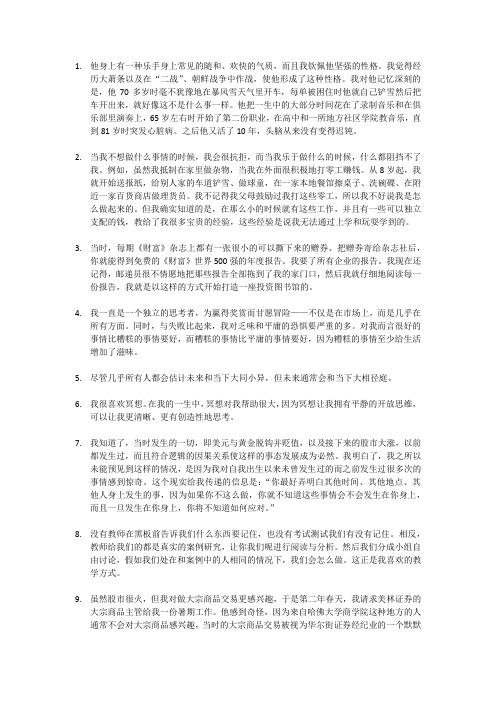
1.他身上有一种乐手身上常见的随和、欢快的气质,而且我钦佩他坚强的性格。
我觉得经历大萧条以及在“二战”、朝鲜战争中作战,使他形成了这种性格。
我对他记忆深刻的是,他70多岁时毫不犹豫地在暴风雪天气里开车,每单被困住时他就自己铲雪然后把车开出来,就好像这不是什么事一样。
他把一生中的大部分时间花在了录制音乐和在俱乐部里演奏上,65岁左右时开始了第二份职业,在高中和一所地方社区学院教音乐,直到81岁时突发心脏病。
之后他又活了10年,头脑从来没有变得迟钝。
2.当我不想做什么事情的时候,我会很抗拒,而当我乐于做什么的时候,什么都阻挡不了我。
例如,虽然我抵制在家里做杂物,当我在外面很积极地打零工赚钱。
从8岁起,我就开始送报纸,给别人家的车道铲雪、做球童,在一家本地餐馆擦桌子、洗碗碟、在附近一家百货商店做理货员。
我不记得我父母鼓励过我打这些零工,所以我不好说我是怎么做起来的。
但我确实知道的是,在那么小的时候就有这些工作,并且有一些可以独立支配的钱,教给了我很多宝贵的经验,这些经验是说我无法通过上学和玩耍学到的。
3.当时,每期《财富》杂志上都有一张很小的可以撕下来的赠券、把赠券寄给杂志社后,你就能得到免费的《财富》世界500强的年度报告。
我要了所有企业的报告。
我现在还记得,邮递员很不情愿地把那些报告全部拖到了我的家门口,然后我就仔细地阅读每一份报告,我就是以这样的方式开始打造一座投资图书馆的。
4.我一直是一个独立的思考者,为赢得奖赏而甘愿冒险——不仅是在市场上,而是几乎在所有方面。
同时,与失败比起来,我对乏味和平庸的恐惧要严重的多。
对我而言很好的事情比糟糕的事情要好,而糟糕的事情比平庸的事情要好,因为糟糕的事情至少给生活增加了滋味。
5.尽管几乎所有人都会估计未来和当下大同小异,但未来通常会和当下大相径庭。
6.我很喜欢冥想。
在我的一生中,冥想对我帮助很大,因为冥想让我拥有平静的开放思维,可以让我更清晰、更有创造性地思考。
亚理斯多德整一原则
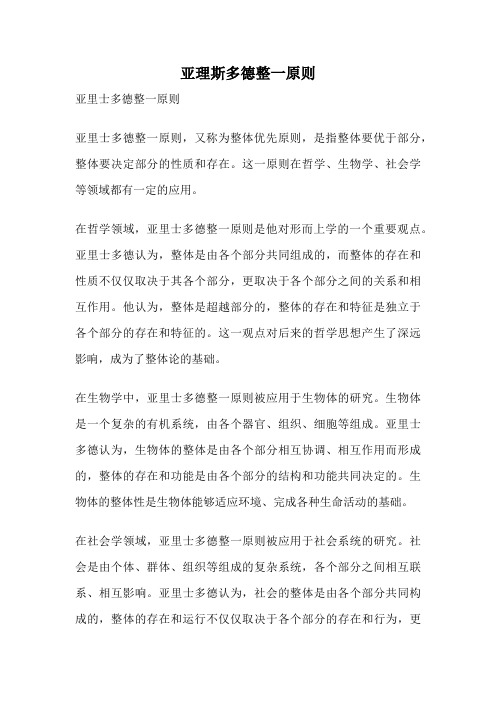
亚理斯多德整一原则亚里士多德整一原则亚里士多德整一原则,又称为整体优先原则,是指整体要优于部分,整体要决定部分的性质和存在。
这一原则在哲学、生物学、社会学等领域都有一定的应用。
在哲学领域,亚里士多德整一原则是他对形而上学的一个重要观点。
亚里士多德认为,整体是由各个部分共同组成的,而整体的存在和性质不仅仅取决于其各个部分,更取决于各个部分之间的关系和相互作用。
他认为,整体是超越部分的,整体的存在和特征是独立于各个部分的存在和特征的。
这一观点对后来的哲学思想产生了深远影响,成为了整体论的基础。
在生物学中,亚里士多德整一原则被应用于生物体的研究。
生物体是一个复杂的有机系统,由各个器官、组织、细胞等组成。
亚里士多德认为,生物体的整体是由各个部分相互协调、相互作用而形成的,整体的存在和功能是由各个部分的结构和功能共同决定的。
生物体的整体性是生物体能够适应环境、完成各种生命活动的基础。
在社会学领域,亚里士多德整一原则被应用于社会系统的研究。
社会是由个体、群体、组织等组成的复杂系统,各个部分之间相互联系、相互影响。
亚里士多德认为,社会的整体是由各个部分共同构成的,整体的存在和运行不仅仅取决于各个部分的存在和行为,更取决于各个部分之间的相互关系和相互作用。
社会的整体性是社会能够协调各个成员、实现共同目标的基础。
总结起来,亚里士多德整一原则强调了整体与部分之间的关系,强调了整体的独立性和优先性。
在哲学、生物学和社会学等领域,这一原则都得到了广泛应用。
亚里士多德整一原则的提出,不仅对学科的发展和研究方法的改进产生了重要影响,更为我们理解世界的整体性和复杂性提供了重要的思考和启示。
瑞.达利欧原则总结
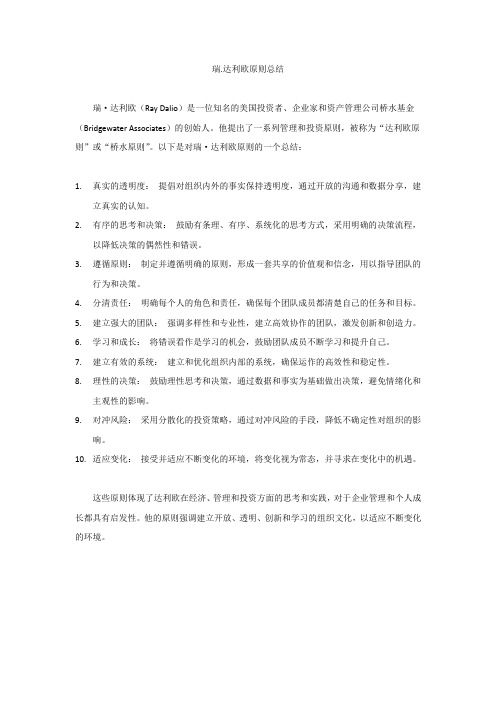
瑞.达利欧原则总结
瑞·达利欧(Ray Dalio)是一位知名的美国投资者、企业家和资产管理公司桥水基金(Bridgewater Associates)的创始人。
他提出了一系列管理和投资原则,被称为“达利欧原则”或“桥水原则”。
以下是对瑞·达利欧原则的一个总结:
1.真实的透明度:提倡对组织内外的事实保持透明度,通过开放的沟通和数据分享,建
立真实的认知。
2.有序的思考和决策:鼓励有条理、有序、系统化的思考方式,采用明确的决策流程,
以降低决策的偶然性和错误。
3.遵循原则:制定并遵循明确的原则,形成一套共享的价值观和信念,用以指导团队的
行为和决策。
4.分清责任:明确每个人的角色和责任,确保每个团队成员都清楚自己的任务和目标。
5.建立强大的团队:强调多样性和专业性,建立高效协作的团队,激发创新和创造力。
6.学习和成长:将错误看作是学习的机会,鼓励团队成员不断学习和提升自己。
7.建立有效的系统:建立和优化组织内部的系统,确保运作的高效性和稳定性。
8.理性的决策:鼓励理性思考和决策,通过数据和事实为基础做出决策,避免情绪化和
主观性的影响。
9.对冲风险:采用分散化的投资策略,通过对冲风险的手段,降低不确定性对组织的影
响。
10.适应变化:接受并适应不断变化的环境,将变化视为常态,并寻求在变化中的机遇。
这些原则体现了达利欧在经济、管理和投资方面的思考和实践,对于企业管理和个人成长都具有启发性。
他的原则强调建立开放、透明、创新和学习的组织文化,以适应不断变化的环境。
杜利奥定律

杜利奥定律杜利奥定律,也称为达利奥原则,是由全球知名的投资家、桥水基金创始人雷·达利奥(Ray Dalio)所提出的一种管理和决策的原则。
该原则被广泛应用于企业管理、投资决策、个人成长等领域,为很多人带来了成功的秘诀。
杜利奥定律的核心思想是“真相是最重要的”,也就是说,只有通过不断地寻找真相,才能做出正确的决策,取得成功。
在这个过程中,要保持开放、透明、诚实的态度,积极地接受反馈和批评,不断地改进自己。
杜利奥定律的实践方法是“原则式思维”,也就是将自己的经验和知识系统化,形成一系列的原则,用来指导自己的决策和行动。
这些原则不是死板的规则,而是基于真实的经验和数据,不断地更新和改进。
杜利奥定律的成功案例是桥水基金。
桥水基金是一家全球知名的对冲基金,以杜利奥定律为管理原则,不断地寻找真相、优化决策,取得了巨大的成功。
桥水基金的管理团队不仅仅是投资专家,更是一群具有良好思维方式和管理能力的人才。
杜利奥定律的应用领域非常广泛。
在企业管理中,可以帮助企业家和管理者制定正确的战略和决策,提高企业的竞争力。
在投资决策中,可以帮助投资者找到真正的投资机会,降低风险,提高收益。
在个人成长中,可以帮助个人形成正确的思维方式和价值观,提高自己的领导力和管理能力。
杜利奥定律的实践需要付出努力和时间。
要想真正掌握这种思维方式,需要不断地学习和实践,不断地反思和总结。
只有坚持不懈地追求真相,才能在竞争激烈的市场中脱颖而出,取得成功。
总之,杜利奥定律是一种非常有价值的管理和决策原则,可以帮助人们在各个领域取得成功。
只有坚持不懈地追求真相,才能不断地优化自己的思维方式和行动,实现自己的梦想。
《原则》雷达里奥
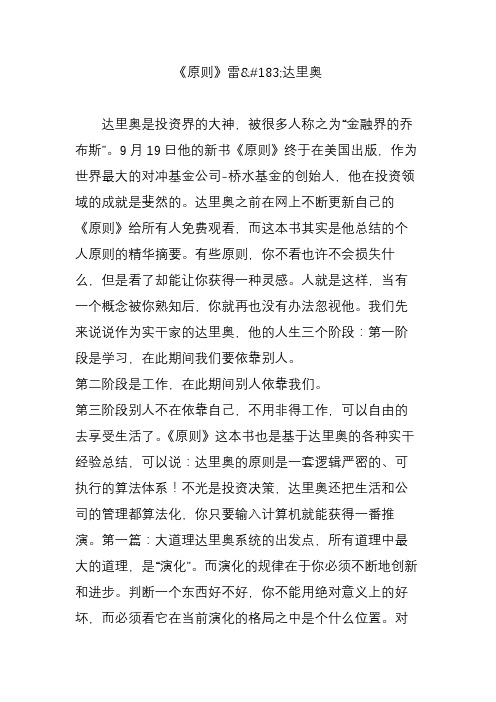
《原则》雷·达里奥达里奥是投资界的大神,被很多人称之为“金融界的乔布斯”。
9月19日他的新书《原则》终于在美国出版,作为世界最大的对冲基金公司-桥水基金的创始人,他在投资领域的成就是斐然的。
达里奥之前在网上不断更新自己的《原则》给所有人免费观看,而这本书其实是他总结的个人原则的精华摘要。
有些原则,你不看也许不会损失什么,但是看了却能让你获得一种灵感。
人就是这样,当有一个概念被你熟知后,你就再也没有办法忽视他。
我们先来说说作为实干家的达里奥,他的人生三个阶段:第一阶段是学习,在此期间我们要依靠别人。
第二阶段是工作,在此期间别人依靠我们。
第三阶段别人不在依靠自己,不用非得工作,可以自由的去享受生活了。
《原则》这本书也是基于达里奥的各种实干经验总结,可以说:达里奥的原则是一套逻辑严密的、可执行的算法体系!不光是投资决策,达里奥还把生活和公司的管理都算法化,你只要输入计算机就能获得一番推演。
第一篇:大道理达里奥系统的出发点,所有道理中最大的道理,是“演化”。
而演化的规律在于你必须不断地创新和进步。
判断一个东西好不好,你不能用绝对意义上的好坏,而必须看它在当前演化的格局之中是个什么位置。
对此达里奥养成了一个习惯:每当我看到自然界或者社会上发生我不喜欢的事情,我总爱问自己,是不是我自己错了?也许在更高的层面上来看,这件事就应该发生。
达里奥是个典型的shaper,马斯克也是。
一般人都是看看自己能干什么,然后去给自己找个市场定位,而他们这类人不同,他们是先问自己想干什么,然后琢磨怎么把这件事干成!这类shaper有两个重要特点:第一,他们的眼界非常宽、非常远,能看到别人看不到的东西,这样他们才能产生想法。
第二,他们为了把这个想法变成现实,会不惜一切代价。
到这里可以先对这本《原则》下个简要的核心概念:演化!这个世界是讲理的,不是全凭运气完全随机。
他认为演化是世界作为一个整体在优化一个什么东西,比如说技术要进步,从低级到高级、从落后到先进。
《原则》读书分享PPT

影响合理决策的两大障碍:自我意识和思维盲点
如果你能承认自己有盲点,并以开放的心态接受其他人可能在 某件事上比你看得更准,他们试图指出的威胁或机会确实存在, 那么你就更有可能做出良好的决策。头脑极度开放是一种能力: 可以有效地探析各种不同的观点和不同的可能性,而不是让你 的自我意识或思维盲点阻碍你。
《原则》读书分享
瑞·达利欧(Ray Dalio)
世界上最大的对冲基金公司桥水创始人,号 称金融界的乔布斯。 过去20多年,桥水基金创造了超过20%的年 平均投资回报率,管理基金规模超过1500亿 美元,累计盈利450亿美元
原则有个体性
我们有着各自不同的目标和性格,所以我们每 个人都必须选择最适合自己目标和性格的原则。 尽管使用他人的原则不一定是一件坏事,但不 假思索地采用他人的原则有可能将你置于风险 之中:你的行动方式将与你的目标和性格不符
痛苦+反思=进步
如果你能养成一种习惯,面对精神痛苦时能够自动地 反思痛苦而不是躲避,你将能快速地学习和进化
每当你遇到痛苦的东西时,你就处在生活中一个潜在的 重要节点:你可以选择健康并痛苦的事实,也可以选择 不健康但舒适的幻觉。妙处在于,如果你选择了健康之 路,痛苦将很快变成快乐。痛苦就是信号,就像不锻炼 的人开始锻炼,养成享受痛苦的习惯,从痛苦中学习, 将让人“步入新境界”。
02
原则可以被应用于类似的 情况以帮助你实现愿望
03
原则让我们更好的解决 现在无法预知的问题
拥抱现实,处理现实
世界上最重要的事情是理解现实如何运行,以及如何应对现实
梦想+现实+决心=成功的生活
理解现实,接受现实,处理现实问题,既是务实的 也是美妙的。取得成功、推动进步的人对现实背后 的因果关系有着深刻的理解,并利用原则实现愿望, 没有深深扎根于现实的理想主义者会制造问题,而 不是推动进步
Principle(Ray Dalio)_Part 2_中文翻译

篇章2:我的最重要的生存原则时间就像一条河流,带着你不停前行,你会碰到各种问题,也要做出各种决定。
你不能停止前行,也不能避免问题。
你要做的是用最好的方式处理问题。
这就是这章所讲的。
我来自哪里?每个人都是基因与环境的产物,而且对待世界有各自不同的看法。
所以有必要先介绍一些我的背景,这样你们可以知道我来自哪里。
我成长于长岛的一个中等规模的社区,父亲是爵士音乐家,母亲是全职太太。
我是一个非常普通的孩子,不那么普通的学生。
喜欢和朋友们一起玩耍,比如在大街上踢足球。
不太喜欢学校,因为我有一个不好的记忆,因为我没办法强制自己去记住别人想要我记住的,自己不理解的东西。
为了激励自己,我需要为我想要的去工作,而不是别人想要我去做的。
为了成功,我需要思考出怎样获取我想要的,而不是要记住别人告诉我的一些事实。
有一件事情是我想要的,那就是花钱。
所以我送报纸,除草,扫雪,在餐馆里洗盘子,当球童,从12岁就开始了。
1960年。
股市火热的时候,每个人都在谈论,尤其是我做球童时候的那些人。
所以我也开始投资。
依然记得我买的第一个股票是东北航空,它是我听说的第一个价格低于5美元的,这样我可以买很多份,我觉得这样比较划算。
后来涨了很多。
是因为它快要破产了,另外一个公司想要购买它,所以翻了三番。
我盈利仅仅是因为幸运,但那个时候并没有意识到。
我就想,这个游戏这么简单。
毕竟,从上千种公司里找出上涨的是很困难的。
相比于其他的工作,这种方式看起来很有趣,而且简单。
当然,后来损失了很多钱,然后意识到做出正确的就选择是多么难以及错误的代价这么高。
所以我真正想做的事如何打败市场。
我必须想出怎么做。
追逐这个目标教会了我很多:1)相信自己的判断是对的,这点很不容易。
市场中,你做了大量的工作,而结果仍然是错的。
2)错误的判断的代价非常的大。
市场中的失误,代价非常大。
我学习到了谨慎。
无论我多么努力的工作,仍然不能确信。
3)舆论往往是错的,所以我必须要成为一个独立思考者。
《原则》解读

《原则》简述书中精华:“极度的开放”原则:对待生活要有科学家对待科学研究的态度,才能真正成为生活的主人,和“优秀想法至上”的原则:公司的决策取决于最合理、最科学的方法,而不是职位层次高级。
在开讲之前,我先给大家介绍一下作者瑞·达利欧,这位华尔街的传奇人物,他有个外号叫“投资界的乔布斯”。
看得远,赢得多,这是华尔街对达利欧的普遍看法,达利欧构想之远大,眼光之深远,令普通人望尘莫及。
他创立的桥水基金,是历史上最赚钱的对冲基金,资产管理规模已经达到了1600亿美元,相当于一万多亿人民币。
当然,我们选择这本书,不只是因为达利欧是成功的投资家,更是因为他的思想。
如果你是一个渴望成功的人,那这本书就非常值得一读。
达利欧在这本书的序言里说,不管他一生中,取得了多么大的成就,绝不是因为他懂得比别人多,而是他知道自己在无知的情况下应该怎么做。
他一生中学到的最重要的事情,就是以原则为基础的生活方式。
有了良好的原则,就相当于有了成功的秘诀。
所以,三十多年前了,达利欧每次遇到新问题,或者犯下了新的错误,他都会有意识地记录下来,慢慢地针对类似的问题,总结出一套行为准则。
这一部《原则》,就是他三十多年来全部总结的精华,甚至可以说,是他奉行的一套严密的人生算法。
全书一共分成三大部分,第一部分是作者瑞·达利欧的个人奋斗史,第二部分是他总结出来的生活原则,第三部分是他总结的工作原则。
我们今天将从生活原则和工作原则这两方面来解读本书。
我们首先来说一说“生活原则”。
这一部分有很多条小原则,主要讲了如何用绝对理性的态度去认识这个世界,换句话说,就是要做到真正地面对现实。
可能很多人都觉得自己是一个“理性的、有原则的人”,其实,要理性地面对现实,没那么简单。
比如,巴菲特曾经说过自己的投资原则有一条是“在别人恐惧的时候贪婪,在别人贪婪的时候恐惧”。
这一条投资的原则听起来简单,但是有股票投资经验的人都知道,真的很难遵从这一条原则,在市场大跌的时候,你很难保持理性,很有可能就跟着其他人一起卖出手上的股票了。
《原则》书解
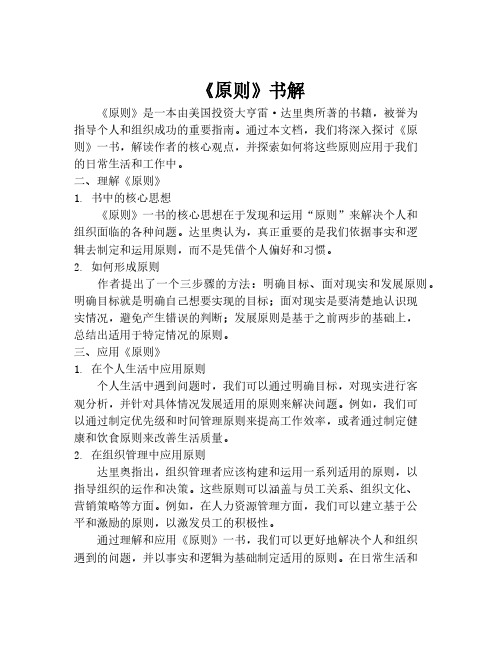
《原则》书解《原则》是一本由美国投资大亨雷·达里奥所著的书籍,被誉为指导个人和组织成功的重要指南。
通过本文档,我们将深入探讨《原则》一书,解读作者的核心观点,并探索如何将这些原则应用于我们的日常生活和工作中。
二、理解《原则》1. 书中的核心思想《原则》一书的核心思想在于发现和运用“原则”来解决个人和组织面临的各种问题。
达里奥认为,真正重要的是我们依据事实和逻辑去制定和运用原则,而不是凭借个人偏好和习惯。
2. 如何形成原则作者提出了一个三步骤的方法:明确目标、面对现实和发展原则。
明确目标就是明确自己想要实现的目标;面对现实是要清楚地认识现实情况,避免产生错误的判断;发展原则是基于之前两步的基础上,总结出适用于特定情况的原则。
三、应用《原则》1. 在个人生活中应用原则个人生活中遇到问题时,我们可以通过明确目标,对现实进行客观分析,并针对具体情况发展适用的原则来解决问题。
例如,我们可以通过制定优先级和时间管理原则来提高工作效率,或者通过制定健康和饮食原则来改善生活质量。
2. 在组织管理中应用原则达里奥指出,组织管理者应该构建和运用一系列适用的原则,以指导组织的运作和决策。
这些原则可以涵盖与员工关系、组织文化、营销策略等方面。
例如,在人力资源管理方面,我们可以建立基于公平和激励的原则,以激发员工的积极性。
通过理解和应用《原则》一书,我们可以更好地解决个人和组织遇到的问题,并以事实和逻辑为基础制定适用的原则。
在日常生活和工作中,我们应该根据实际情况明确目标、面对现实,并发展适用的原则,以实现个人和组织的成功与进步。
以上为《原则》书解的内容,希望能够对您理解和应用此书提供一定的帮助。
如果您需要更多详细信息,请参考原著。
祝您取得成功!。
中文翻译(HCY)_Principle(Ray Dalio)_Part 1

原则By Ray Dalio接下来的三个独立的篇章,可以连着一起读,也可以分段读。
篇章1主要讲的是,拥有原则的目的和重要性,和我自身没什么联系。
篇章2解释了我的最重要的生存原则,适用于我的一切。
篇章3,说明了我在Bridgewater的管理原则。
因为我的管理原则是我的生存原则在管理中的应用,所以阅读篇章2会有助于理解篇章3,但并不是要求的,你也可以直接阅读篇章3来了解什么是我的管理原则以及Brigewater是怎样运行的。
某一天活血我会写篇章4,关于我的投资原则。
简介篇章1:原则的重要性篇章2:我的最重要的生存原则篇章3:我的管理原则简介原则是概念性的,适用于类似的事件,而不是针对具体问题的狭隘的答案。
每个游戏都有原则,成功的玩家正是掌握了这种原则,所以成功。
生存也是如此。
原则就是能够成功的处理与自然界法则或生存法则的方法。
对原则懂得越多,理解的越充分,在处理与世界的关系是越有效率,反之则效率低下。
具体问题具体分析,生存的每个方面都有不同的原则。
比如:“滑冰原则”用来指导滑冰,“父母原则”用来指导如果做好父母,“管理原则”指导如何管理,“投资原则”指导如何投资等等,也有首要的影响着一些事情的“生存原则”。
当然了,每个人都有自己信任的不同的原则。
我相信能让Bridgewater成功以及我经历的能够获得好的结果的某些原则。
创建一个优秀的文化,寻找到正确的人员,管理他们去做伟大的事情和创造性的系统性的解决问题是所有组织都面临的挑战。
不同的是他们处理这些挑战的方式。
下面列出的原则是我们处理挑战的方式,也是我们的独特结果的原因所在。
Bridgewater的成功,源自于优秀员工对于原则的执行,依照这种方式,成功将持续。
就像减肥,最终每个人都可以做到,只要他们愿意相关的付出。
接下来是我理解的付出:我最重要的生存原则,我用来获取我所需的方法,以及我的管理原则。
综上,这些原则是:系统性的追寻真相和优秀的流程以及伴随这种追寻的奖励。
原则书本介绍
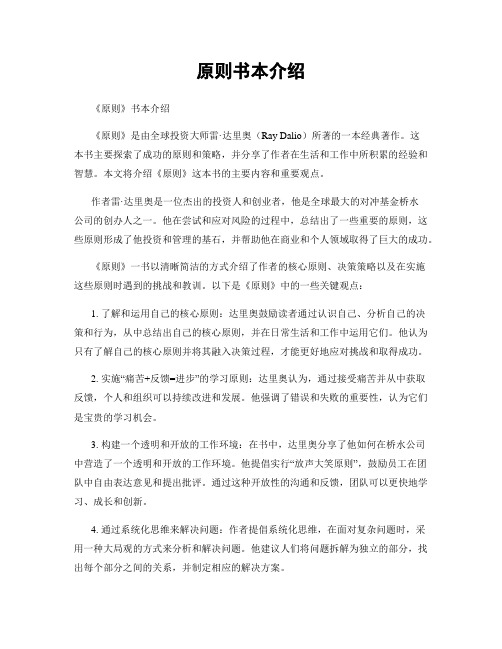
原则书本介绍《原则》书本介绍《原则》是由全球投资大师雷·达里奥(Ray Dalio)所著的一本经典著作。
这本书主要探索了成功的原则和策略,并分享了作者在生活和工作中所积累的经验和智慧。
本文将介绍《原则》这本书的主要内容和重要观点。
作者雷·达里奥是一位杰出的投资人和创业者,他是全球最大的对冲基金桥水公司的创办人之一。
他在尝试和应对风险的过程中,总结出了一些重要的原则,这些原则形成了他投资和管理的基石,并帮助他在商业和个人领域取得了巨大的成功。
《原则》一书以清晰简洁的方式介绍了作者的核心原则、决策策略以及在实施这些原则时遇到的挑战和教训。
以下是《原则》中的一些关键观点:1. 了解和运用自己的核心原则:达里奥鼓励读者通过认识自己、分析自己的决策和行为,从中总结出自己的核心原则,并在日常生活和工作中运用它们。
他认为只有了解自己的核心原则并将其融入决策过程,才能更好地应对挑战和取得成功。
2. 实施“痛苦+反馈=进步”的学习原则:达里奥认为,通过接受痛苦并从中获取反馈,个人和组织可以持续改进和发展。
他强调了错误和失败的重要性,认为它们是宝贵的学习机会。
3. 构建一个透明和开放的工作环境:在书中,达里奥分享了他如何在桥水公司中营造了一个透明和开放的工作环境。
他提倡实行“放声大笑原则”,鼓励员工在团队中自由表达意见和提出批评。
通过这种开放性的沟通和反馈,团队可以更快地学习、成长和创新。
4. 通过系统化思维来解决问题:作者提倡系统化思维,在面对复杂问题时,采用一种大局观的方式来分析和解决问题。
他建议人们将问题拆解为独立的部分,找出每个部分之间的关系,并制定相应的解决方案。
5. 创造成功的组织文化:在书中,达里奥分享了他对组织文化的理解和实践。
他强调了透明度、自由和责任的重要性,并解释了如何通过建立明确的目标和激发人们的创造力来创造成功的组织文化。
这本书不仅涵盖了作者在商业和投资领域的经验,也包含了他在个人生活中的成功原则。
原则书籍作文模板英语
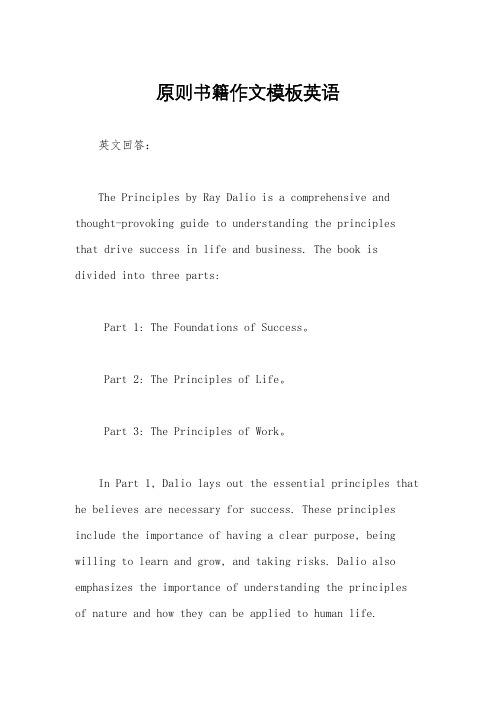
原则书籍作文模板英语英文回答:The Principles by Ray Dalio is a comprehensive and thought-provoking guide to understanding the principlesthat drive success in life and business. The book is divided into three parts:Part 1: The Foundations of Success。
Part 2: The Principles of Life。
Part 3: The Principles of Work。
In Part 1, Dalio lays out the essential principles that he believes are necessary for success. These principles include the importance of having a clear purpose, being willing to learn and grow, and taking risks. Dalio also emphasizes the importance of understanding the principles of nature and how they can be applied to human life.In Part 2, Dalio explores the principles that he believes are essential for a happy and fulfilling life. These principles include the importance of relationships, love, and having a positive attitude. Dalio also discusses the importance of understanding the principles of psychology and how they can be used to improve our lives.In Part 3, Dalio turns his attention to the principles that he believes are essential for success in work. These principles include the importance of setting goals, being organized, and working hard. Dalio also emphasizes the importance of teamwork and collaboration.The Principles is a valuable resource for anyone who is interested in succeeding in life and business. The book is full of practical advice and insights that can help you to achieve your goals.中文回答:雷·达里奥《原则》读后感。
达欧 原则
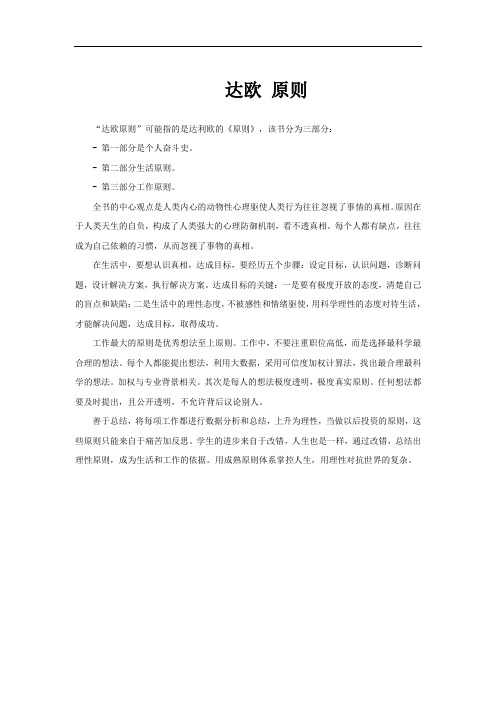
达欧原则
“达欧原则”可能指的是达利欧的《原则》,该书分为三部分:
- 第一部分是个人奋斗史。
- 第二部分生活原则。
- 第三部分工作原则。
全书的中心观点是人类内心的动物性心理驱使人类行为往往忽视了事情的真相。
原因在于人类天生的自负,构成了人类强大的心理防御机制,看不透真相。
每个人都有缺点,往往成为自己依赖的习惯,从而忽视了事物的真相。
在生活中,要想认识真相,达成目标,要经历五个步骤:设定目标,认识问题,诊断问题,设计解决方案,执行解决方案。
达成目标的关键:一是要有极度开放的态度,清楚自己的盲点和缺陷;二是生活中的理性态度,不被感性和情绪驱使,用科学理性的态度对待生活,才能解决问题,达成目标,取得成功。
工作最大的原则是优秀想法至上原则。
工作中,不要注重职位高低,而是选择最科学最合理的想法。
每个人都能提出想法,利用大数据,采用可信度加权计算法,找出最合理最科学的想法。
加权与专业背景相关。
其次是每人的想法极度透明,极度真实原则。
任何想法都要及时提出,且公开透明,不允许背后议论别人。
善于总结,将每项工作都进行数据分析和总结,上升为理性,当做以后投资的原则,这些原则只能来自于痛苦加反思。
学生的进步来自于改错,人生也是一样,通过改错,总结出理性原则,成为生活和工作的依据。
用成熟原则体系掌控人生,用理性对抗世界的复杂。
《穿越债务危机》by雷·达里奥 Part1
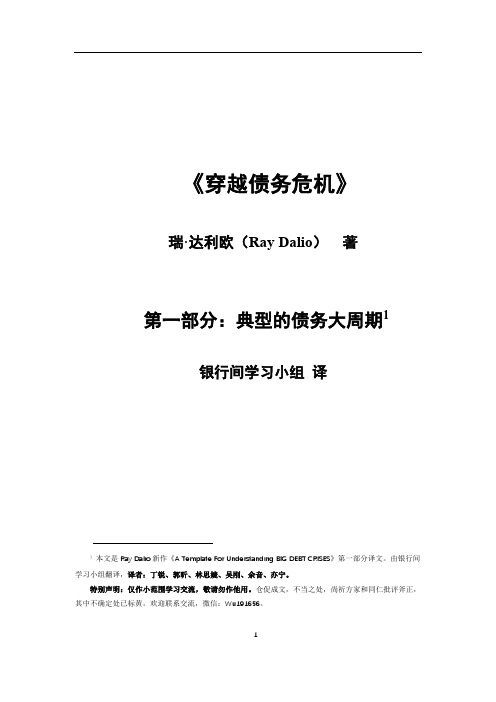
《穿越债务危机》瑞·达利欧(Ray Dalio)著第一部分:典型的债务大周期1银行间学习小组译1本文是Ray Dalio新作《A Template For Understanding BIG DEBT CRISES》第一部分译文。
由银行间学习小组翻译,译者:丁锐、郭昕、林思婕、吴刚、余音、亦宁。
特别声明:仅作小范围学习交流,敬请勿作他用。
仓促成文,不当之处,尚祈方家和同仁批评斧正,其中不确定处已标黄。
欢迎联系交流,微信:Wu191656。
1目录前言 (3)典型的债务大周期 (5)如何看待信贷和债务 (5)典型的长期/大型债务周期模型 (10)对周期的考察 (11)经典通缩型债务周期的各个阶段 (14)1)早期阶段 (14)2)泡沫阶段 (14)3)周期顶部 (19)4)萧条阶段 (22)5)“漂亮去杠杆” (32)6)“推绳子效应” (36)7)正常化 (39)通胀型萧条和货币危机 (40)经典通胀型债务周期的各个阶段 (43)1)早期阶段 (43)2)泡沫阶段 (44)3)周期顶点和货币防御 (47)4)大萧条阶段(通常货币自由浮动) (51)5)正常化 (57)从短暂的通胀型衰退到恶性通胀的螺旋上升 (61)如何发生螺旋式上升 (61)战时经济 (65)总结 (70)2前言本书作于2008年金融危机十周年之际。
十年前,作为投资人的我依靠所研发的理解债务危机运行的模型,安全度过金融危机。
现在,我想在此分享这个模型,希望能够降低未来债务危机发生的可能性,并帮助政策制定者更好地应对债务危机。
与大多数经济学家和政策制定者不同,作为投资者,我根据经济变化在金融市场上下注,这迫使我关注那些导致资本流动的相对价值和趋势的变动。
这些,反过来,也是周期的驱动力量。
在研究它们的过程中,我发现,作为一个全球宏观投资者,没有什么比提供教科书中所没有的实用经验更令人开心,也没有什么比判断失误更让人沮丧。
总是有自己没有遇到过的问题对我造成打击,这使我开始尝试用超越个人经验的视角来审视历史上所有重大的经济和市场变迁。
雷·达利欧《原则》超经典语录大全
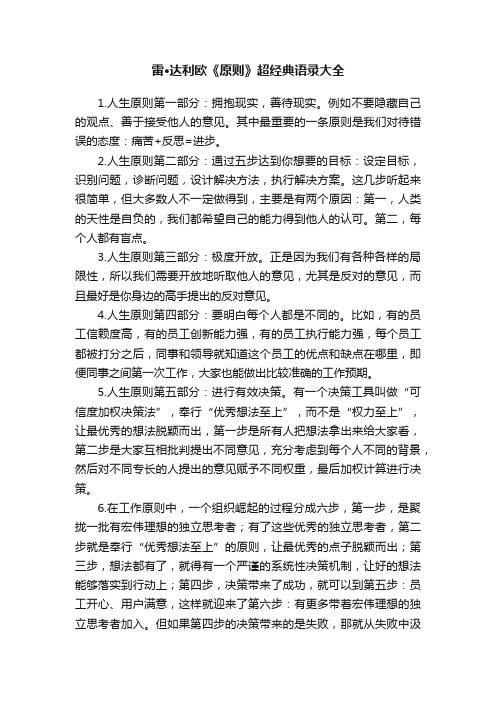
雷·达利欧《原则》超经典语录大全1.人生原则第一部分:拥抱现实,善待现实。
例如不要隐藏自己的观点、善于接受他人的意见。
其中最重要的一条原则是我们对待错误的态度:痛苦+反思=进步。
2.人生原则第二部分:通过五步达到你想要的目标:设定目标,识别问题,诊断问题,设计解决方法,执行解决方案。
这几步听起来很简单,但大多数人不一定做得到,主要是有两个原因:第一,人类的天性是自负的,我们都希望自己的能力得到他人的认可。
第二,每个人都有盲点。
3.人生原则第三部分:极度开放。
正是因为我们有各种各样的局限性,所以我们需要开放地听取他人的意见,尤其是反对的意见,而且最好是你身边的高手提出的反对意见。
4.人生原则第四部分:要明白每个人都是不同的。
比如,有的员工信赖度高,有的员工创新能力强,有的员工执行能力强,每个员工都被打分之后,同事和领导就知道这个员工的优点和缺点在哪里,即便同事之间第一次工作,大家也能做出比较准确的工作预期。
5.人生原则第五部分:进行有效决策。
有一个决策工具叫做“可信度加权决策法”,奉行“优秀想法至上”,而不是“权力至上”,让最优秀的想法脱颖而出,第一步是所有人把想法拿出来给大家看,第二步是大家互相批判提出不同意见,充分考虑到每个人不同的背景,然后对不同专长的人提出的意见赋予不同权重,最后加权计算进行决策。
6.在工作原则中,一个组织崛起的过程分成六步,第一步,是聚拢一批有宏伟理想的独立思考者;有了这些优秀的独立思考者,第二步就是奉行“优秀想法至上”的原则,让最优秀的点子脱颖而出;第三步,想法都有了,就得有一个严谨的系统性决策机制,让好的想法能够落实到行动上;第四步,决策带来了成功,就可以到第五步:员工开心、用户满意,这样就迎来了第六步:有更多带着宏伟理想的独立思考者加入。
但如果第四步的决策带来的是失败,那就从失败中汲取教训,进行反馈和总结,直到成功为止。
7.一个工作原则叫“极度透明和极度真实”,比如,在桥水基金内部,下属被充分赋予了权限,可以直接挑战上级,甚至是公司最高层的老板。
- 1、下载文档前请自行甄别文档内容的完整性,平台不提供额外的编辑、内容补充、找答案等附加服务。
- 2、"仅部分预览"的文档,不可在线预览部分如存在完整性等问题,可反馈申请退款(可完整预览的文档不适用该条件!)。
- 3、如文档侵犯您的权益,请联系客服反馈,我们会尽快为您处理(人工客服工作时间:9:00-18:30)。
接下来的三个独立的篇章,可以连着一起读,也可以分段读。篇章1主要讲的是,拥有原则的目的和重要性,和我自身没什么 中文翻译(HCY)_Principle(Ray Dalio)_Part 1_文档下载/b-e6e2df5328ea81c758f578e9.html 联系。篇章2解释了我的最重要的生存原则,适用于我的一切。篇章3,说明了我在Bridgewater的管理原则。因为我的管理原则是我的生存原则在管理中的应用,所以阅读篇章2会有助于理解篇章3,但并不是要求的,你也可以直接阅读篇章3来了解什么是我的管理原则以及Brigewater是怎样运行的。某一天活血我会写篇章4,关于我的投资原则。
当然了,也有其他的一些原则,比如我的投资原则。然而,管理原则是目前我们最需要的,所以接下来就是我认为有效的和能为我工作的一些原则。
篇章1:原则的重要性
想要获得生命之外的东西,拥有原则是非常重要的。我认为理解对方,首先要理解对方的原则。这也是为什么我们要讨论原则的原因。
我们以下列测试来开始:
1) 什么是原则?
你认为重要的东西,就是你的价值。原则就是帮助你获得这些价值。原则连接你的价值和行动;原则指导你的行动,帮助你成功的与现实规则打交道。原则就是你面临困难选择时需要参考的东西。
2) 原则为什么重要?
所有成功的人一定有他们的原则在帮助他们。没有原则,你就会被强迫做出一些反应而没有仔细思考你最重要的东西以及如何行动才能获得你需要的。这样你就很难成功。个人没有原则容易失败,一个组织如果没有原则会更失败。
你必须回到这些问题。重要的是,接下来的这些原则,你必须自己思考然后实践这些原则/理念。把“Ray’s原则”转化为“我的原则”,然后“Ray”将会从你的记忆中慢慢褪去。 所以,不经思考的采纳原则是有风险的。我希望你们能加入我一起彻底的讨论这些指导我们行动的原则。遇到每个原则时,请首先问自己,“这是真的吗”这篇文章表述的是我个人相信的一些原则,其他人也会有他们各自的原则。三人行,必有我师。则其善者而从之,其不善者而改之。
3) 原则来自于哪里?
有时候我们会伪造自己的原则,有时候会采用别人的原则,或者全盘接受一个地区组织和合法系统的原则。运用别人的原则并不难,难的是发现自己的原则。简单接受已有的原则而不进行深入思考,是有风险的。不完整的原则有时候会导致价值与行动的矛盾。你的原则必须反应你真正相信的价值。
4) 你生活中有哪些原则?具体是什么?
Байду номын сангаас
我写的原则并不是我的发现,我只是解释我个人所相信的一部分。我相信我的同事以及我关心的人都应该好好想想这些原则。我整理了这些原则,解释了其背后的逻辑关系,这样我们可以发现这些原则的好处以及对这些原则进行压力测试。我确信的原则是因为我仔细思考过,而且这些原则很多年来使我的生活很好。我相信没有什么事是必然的。我相信我们所希望的最好是有很大的概率可以实现的。实践这些原则,并压力测试他们,成功的可能性会不停增加。
接下来是我理解的付出:我最重要的生存原则,我用来获取我所需的方法,以及我的管理原则。综上,这些原则是:系统性的追寻真相和优秀的流程以及伴随这种追寻的奖励。我写下来是为了帮助Bridgewater和我最在乎的人。
直到最近,我都没有写这些原则,因为我觉得告诉别人怎样做才能做到最好有点冒昧。但一直以来,都有一些我关心的人在艰难的处理问题,他们也主动要求我的帮助。我也发现他们的大多数的问题是因为违反了某些原则而导致的。所以我开始写下这些问题的种类以及这些问题违反了哪些原则。当我开始写的时候,我并不知道会有多少原则,但是通过这个过程,我发现了差不多200个原则几乎可以覆盖所有的问题。我确信我会知道的越多,写的越多。
我相信能让Bridgewater成功以及我经历的能够获得好的结果的某些原则。创建一个优秀的文化,寻找到正确的人员,管理他们去做伟大的事情和创造性的系统性的解决问题是所有组织都面临的挑战。不同的是他们处理这些挑战的方式。下面列出的原则是我们处理挑战的方式,也是我们的独特结果的原因所在。Bridgewater的成功,源自于优秀员 中文翻译(HCY)_Principle(Ray Dalio)_Part 1_文档下载/b-e6e2df5328ea81c758f578e9-2.html 工对于原则的执行,依照这种方式,成功将持续。就像减肥,最终每个人都可以做到,只要他们愿意相关的付出。
我也相信人们的来自于自身经历的原则,而不是被教会的或者只是简单接受别人的原则。所以我所说的这些原则,你可以用来反思你的遭遇,而不是盲目的遵从。我希望你们能够仔细思考并在合适的时机应用他们。但在这之前,首先问自己:“这是真的吗?”
在开始讨论管理原则之前,清晰的表达我的最重要的生存原则,是非常必要的。因为前者来自于后者。
什么是原则?
原则为什么重要?
原则来自于哪里?
你生活中有哪些原则?具体是什么?
你认为你的原则运行的怎么样?为什么?
要诚实的回答以上问题,不用担心其他人的看法。诚实会让你对自己的原则感觉舒适,判断你是如何应用你的原则的。如果你没有很多经过深思熟虑的原则,不要担心。保持开放的观点,我们一起来讨论。
篇章1,解释了我对原则的理解,为什么我认为原则是重要的,以及原则在我的生活中的必要性。
篇章2解释了我最重要的生存原则。描述了我认为最重要的原则:如何与现实打交道,如何有效率的获取你想要的。也讨论了一些生活中阻止人们成功的一些常见的陷阱,以及如何避免这些陷阱。
篇章3是有关我的管理原则。我管理Bridgewater已经超过35年了,这些管理原则指导公司如何发展到目前的地步。首先描述了一个大的远景,概念性的,就是一个公司的成功取决于他的员工以及文化。然后就是去挖掘隐藏在创建优秀文化、雇佣优秀员工以及如何管理他们来到达出色,系统的解决问题和做出正确的决定的重要的原则。
最有价值的原则来自于我们的的生活经验以及对经验的总结。每次面临困难选择的时候,问那些使自己难以回答的问题会让我们的原则清晰化。例如,华盛顿的众议员在调查不同社会组织的行为是否符合伦理时,同时他们会提取一些问题,比如政府应该惩罚不符合伦理行为的组织吗,还是记录下来并形成法律?类似的问题,可以提升对政府的评价。另外一个例子,“我不偷窃”可以作为一个原则,当你面临是否偷窃时。但是,最有效的是,你的每个原则都要符合你的价值观,这就需要你持续的问自己:为什么?你不偷窃是因为你对受害者感同身受?还是因为你害怕被逮住?不停的问自己,这样我们才能提高理解的纯度,发展我们的原则使之更加符合我们的价值观。想要成功,你必须做出正确的,艰难的选择。你必须要能够“断臂求生”,无论是在个人水平上还是组织水平上。要成为一个伟大的领导者,你必须做出明白的决策和照顾你的员工,而不是随大众。
你的原则将指导你行动的标准。当你和他人发生人际关系时,你和你的原则决定你的行动。拥有共同价值观和原则的人会相处的 很好,“人以群分,物以类聚”。反之,则会承受误解和冲突带来的伤害。人际关系中,人们的原则往往不清晰。想想你最亲近的人。他们的原则和你的一致吗?
5) 你认为你的原则运行的怎么样?为什么?
Ray Dalio的这篇惊世之作,每读一次,都有提升。 让你更加从容的适应社会的变化,只要慢慢掌握了这些原则,每个人都是成功者。 目前还没有汉语翻译的版本,这次我准本分3部分上传。 已经翻译好了第1部分,先上传。后续会有第2,第3部分的上传。 翻译版权归翻译者所有!
原则
By Ray Dalio
简介
篇章1:原则的重要性
篇章2:我的最重要的生存原则
篇章3:我的管理原则
简介
原则是概念性的,适用于类似的事件,而不是针对具体问题的狭隘的答案。每个游戏都有原则,成功的玩家正是掌握了这种原则,所以成功。生存也是如此。原则就是能够成功的处理与自然界法则或生存法则的方法。对原则懂得越多,理解的越充分,在处理与世界的关系是越有效率,反之则效率低下。具体问题具体分析,生存的每个方面都有不同的原则。比如:“滑冰原则”用来指导滑冰,“父母原则”用来指导如果做好父母,“管理原则”指导如何管理,“投资原则”指导如何投资等等,也有首要的影响着一些事情的“生存原则”。当然了,每个人都有自己信任的不同的原则。
